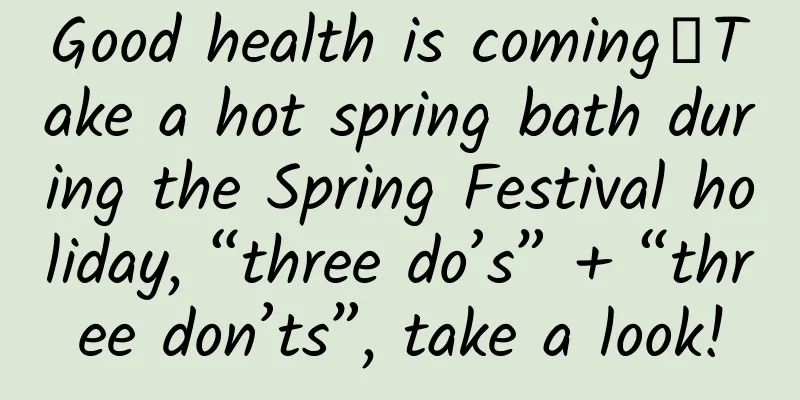Good health is coming丨Take a hot spring bath during the Spring Festival holiday, “three do’s” + “three don’ts”, take a look!

|
During the long Spring Festival holiday, many people will go out to soak in hot springs to relax and maintain health. Hot springs can promote blood circulation, relieve joint pain and limb numbness, improve sleep quality, beautify the skin, etc. How to soak in hot springs correctly in winter? In what cases should you not soak in hot springs? Who should not soak in hot springs? Huang Juan, deputy chief physician of the Department of Endocrinology of the First Affiliated Hospital of Hunan University of Chinese Medicine, will introduce it in detail. Three things to consider when taking a hot spring bath in winter 1. Appropriate steps When soaking in a hot spring, first slowly put your feet into the pool, adjust to the water temperature at the edge of the pool, then use your hands to splash the hot spring water all over your body, and finally immerse your whole body in the water. At the same time, you should gradually transition from a low-temperature pool to a high-temperature pool. 2. Suitable temperature The water temperature for hot spring bathing is between 38 and 42 degrees Celsius, which can dispel the coldness without scalding the skin or adding burden to the body. The appropriate temperature allows the body to naturally blend into the hot spring environment and achieve the effect of health preservation. 3. Suitable time The recommended time for hot spring bathing is 15 to 20 minutes each time, and then rest for a while before continuing. Long-term soaking will cause the body to overheat and dehydration, and cause symptoms such as dizziness and fatigue. Three things not to do when taking a hot spring bath in winter 1. Do not take a hot spring bath when you are hungry or full When the stomach is empty, the body's energy reserves are insufficient. When soaking in hot springs, the body is heated and blood circulation speeds up, which can easily lead to hypoglycemia, dizziness, palpitations, fatigue and other symptoms. After a full meal, the stomach and intestines are busy digesting food, so soaking in hot springs at this time can cause indigestion, nausea and vomiting and other discomforts. 2. It is not advisable to take a hot spring bath after drinking alcohol After drinking, alcohol will cause blood vessels to dilate. When soaking in a hot spring, the body is heated and the blood vessels further dilate, which can easily increase the burden on the heart and cause palpitations, chest tightness, etc. 3. People who are not suitable for hot springs Diabetic patients: When fasting blood sugar is ≥13.9 mmol/L or ≤4.0 mmol/L, taking a hot spring bath may cause blood sugar fluctuations, leading to hypoglycemic coma, hyperosmolar coma, etc. For patients with hypertension: when systolic blood pressure is ≥160 mmol per liter or diastolic blood pressure is ≥100 mmol per liter, soaking in hot springs may cause vasodilation and drastic changes in blood pressure, increasing the risk of cardiovascular and cerebrovascular accidents. Patients with heart disease: If you have had frequent angina attacks recently, uncontrolled heart failure, or severe arrhythmias, taking a hot spring bath may increase the burden on your heart and endanger your life. People with weak constitutions: For those who are weak or have just recovered from a serious illness, their blood vessels will dilate when they take a hot spring bath, which can lead to insufficient blood supply to the brain, causing dizziness, fatigue, and even fainting. Pregnant women: Pregnant women are not suitable for hot springs during the entire pregnancy period, especially in the early and late stages of pregnancy. High temperatures may have adverse effects on fetal development. When you are feeling unwell, such as if you have a cold or fever, soaking in hot springs will further increase your body temperature, which is not conducive to your recovery. If your skin is damaged or infected, the minerals and microorganisms in the hot springs can easily invade the wound, thus aggravating the infection. Doctors remind: moderate hot spring bathing can relax the body and mind, promote blood circulation, relieve fatigue, and help the body preserve in winter, which is in line with the health-preserving principle of "get rid of cold and warm up, without draining the skin and causing the qi to be lost". However, patients with chronic diseases should consult a doctor before bathing in hot springs, and decide whether it is suitable to bathe in hot springs based on their own physical condition. Hunan Medical Chat Special Author: Li Meiying and Liu Jingjing, First Affiliated Hospital of Hunan University of Chinese Medicine Follow @湖南医聊 to get more health science information! (Edited by Wx) |
Recommend
What is the reason why a lump grows on the vulva and it hurts?
A lump on the vulva cannot be ignored, because ma...
I fell down while 8 months pregnant
In the later stages of pregnancy, as the pregnanc...
What is the reason for brown vaginal discharge during the menstrual period?
Leucorrhea is an important sign of whether a woma...
Ways to relieve menstrual chest pain
For some female friends, menstruation is a very p...
Is your menstrual cramps getting worse? It could be adenomyosis at work!
31-year-old Ms. Huang suffered from increasingly ...
New research reveals: People who exercise and stay up late may have been "ineffectively exercising"
Expert interviewed: Gao Wei, chief physician of t...
What causes severe dysmenorrhea?
Every female will have her first menstruation dur...
What department is better for itchy nipples?
Itchy nipples are a relatively dangerous symptom,...
Clinical research | Clinical treatment of diabetic patients, stem cell transplantation treatment satisfaction rate 80%
Clinical researchers from the Department of Endoc...
What are the dietary taboos for pelvic inflammatory disease
Pelvic inflammatory disease can be cured through ...
[Health and wellness] Today is the end of the dog days! The 29 "dangerous" days of the year are here, learn some health knowledge to stay safe!
Content source: People's Daily WeChat, Health...
What color is Chanel 226 lip glaze? Chanel 226 lip glaze color test
Chanel 226 lip glaze is a new color for this autu...
Six months pregnant vaginal pain
When a woman is pregnant, her body will be abnorm...
Frequent diarrhea after pregnancy
As we all know, many problems will appear in wome...
What is the reason for high LDL in pregnant women?
The situation of pregnant women is quite special....









